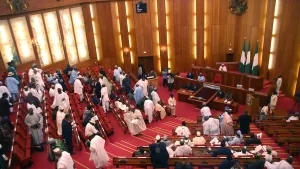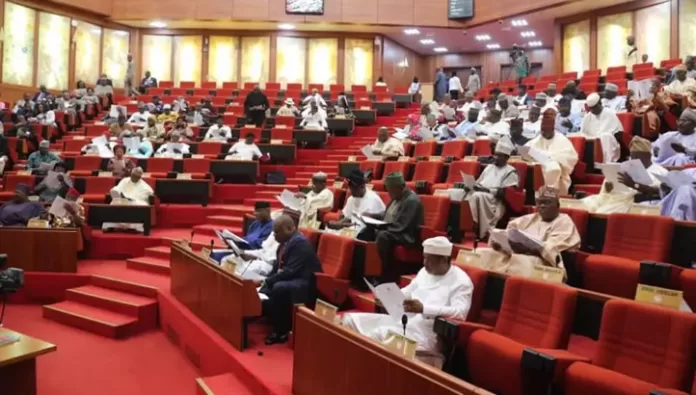The Senate on Thursday passed for second reading, the tax reform bills forwarded to it by President Bola Tinubu in October 2024.
The passage followed a debate among the lawmakers.
The bill was thereafter referred to the Committee on Finance, which was asked to revert in not more than six weeks.
Before the debate, the lawmakers had earlier gone into about an hour closed-door session. On their return from the executive session, the Senate Leader, Opeyemi Bamidele (APC, Ekiti Central), led the debate on the bill.
The four tax bills sent to the National Assembly include the Nigeria Tax Bill 2024, which is expected to provide the fiscal framework for taxation in the country, and the Tax Administration Bill, which will provide a legal framework for all taxes in the country and reduce disputes.
Others are the Nigeria Revenue Service Establishment Bill, which will repeal the Federal Inland Revenue Service Act and establish the Nigeria Revenue Service; and the Joint Revenue Board Establishment Bill which will create a tax tribunal and a tax ombudsman.
Bamidele said, “The Nigerian tax reforms bill is a significant move to overhaul the country’s tax system. These bills aim to simplify the tax landscape, reduce the burden on small businesses, and streamline how taxes are collected.
“In broad terms, the four bills seek to ensure uniformity in tax revenue administration in Nigeria in accordance with the provisions of the Constitution, eliminate the incidence of double taxation across the country, deploy taxation as a tool to encourage private sector investments in critical industries and boost individual disposal incomes through targeted tax exemptions as captured in the various Bills.

READ ALSO: Reps Joins Senate, Sacks CCT Chairman Danladi Umar Over Misconduct
In the area of tax exemptions, specifically, the bills propose exempting minimum wage earners from income tax deductions and providing tax breaks for small businesses with an annual turnover of N50 million or less. Additionally, the plan outlines a gradual decrease in corporate income tax from 30% to 25% by 2026.
The proposed legislation received support from a number of lawmakers, including Senators Sani Musa (APC, Niger East), Seriake Dickson (PDP, Bayelsa West), and Tahir Mongunu (APC, Borno North). However, Senator Ali Ndume (APC, Borno South) voiced his opposition, requesting a delay in the bill’s progression to allow for further consultation, particularly regarding issues surrounding derivation and value-added tax (VAT).
Following a voice vote, the majority of senators approved the bills for further review. Notably, President Tinubu’s economic team was present during the plenary session to provide detailed explanations to the lawmakers. The team consisted of the Chairman, Presidential Committee on Fiscal Policy and Tax Reforms, Taiwo Oyedele; the Chairman, Federal Inland Revenue Tax, Zacchaeus Adedeji; and the Director-General, Budget Office, Tanimu Yakubu.
The tax reform bills are now referred to the Senate Committee on Finance for further review and are expected to be reported back within six weeks.

